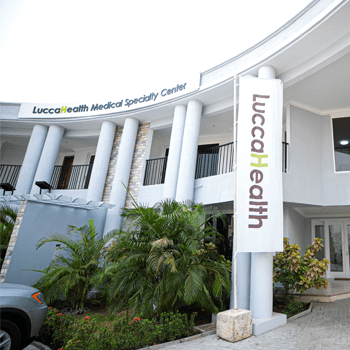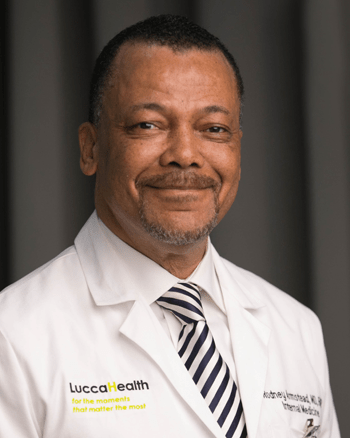It might be a challenge to develop a new medical facility in the United States. But it’s nothing compared to developing one in sub Saharan Africa.
That’s what Dr. Rodney Armstead learned on his 5-year quest to open the first specialty practice and minimally invasive surgery center in Accra, the capital city of Ghana.
LuccaHealth Medical Specialty Center has two campuses in Accra. One opened in November 2019 and the other in February 2020. Together, they will offer 11 specialties and minimally invasive (laparoscopic) same day surgery when LuccaHealth is fully operational at the end of 2021:

- Cardiology
- ENT (ear, nose, throat) and head & neck
- Gastroenterology
- General Surgery
- Gynecology
- Internal Medicine
- Neurology
- Nephrology
- Ophthalmology (retina disease specialist)
- Pain Management
- Urology
Changing Medical Care in Ghana
In Africa, 11 percent of the population drives 25 percent of the world disease burden, Dr. Armstead says. “That’s people developing chronic illness like diabetes, hypertension and cancer.” Those staggering numbers illustrates the the need for an the extraordinary specialty gap, whether it’s a surgical specialty or a medical specialty,” he says. That means people had to leave West Africa to get the care they need. Now they can get that care closer to home. “We will bring these types of solutions not only to Ghana, but to West Africa, as a U.S. owned and operated Center of Excellence—delivering through a high quality patient-centric model. We will become the referral destination, rather than people going to South Africa, India, the UK or US for care.”
Why Ghana?

Dr. Armstead, who spent time working in government during the Clinton administration before joining UnitedHealthcare, was looking for private equity opportunities. Enter Cheryl Mills, CEO of BlackIvy Group, an investment firm with operations in sub-saharian Africa. She is the former chief of staff at the US State Department who saw huge opportunity for investing in Africa.
But which of the more than 50 countries in Africa would be the right one?
The criteria for deciding where to invest included looking at the country’s GDP growth trajectory, the status of its middle class, the stability of its democracy and the country’s history of embracing private investment.
That narrowed the search to just three countries: Tanzania and Kenya in East Africa and Ghana in West Africa. BlackIvy was already working in East Africa, so it made sense to choose Accra, a thriving metropolis with more than four million people, as the hub of LuccaHealth in West Africa.
You’re Not in America Any More
In the US, building a new medical facility simply requires identifying the demand and filling it. In a developing country, there are many more hurdles.
That means the initial risk is much greater. Dr. Armstead had to convince investors that he could build the medical centers, attract doctors to work there and drive customers to seek care. “That’s a big thing to convince investors around, because that’s in contravention to how you would expand in the US,” he says.
Once the investment was secured, he had to negotiate the vagaries of Ghana.
“It requires a certain level of humility to understand that in order to navigate here, you have to really be here, you have to live here, you have to understand and embrace how they do things.”
For example, he says, just because something is written in a regulation doesn’t necessarily mean it works that way. “It’s an important mindset hurdle you have to overcome. You can’t do it from abroad. You have to be in Africa.”
Even so, the challenges were many. Ghanaian architects don’t work the way American architects do. Ghanaian construction workers don’t have the same level of expertise American construction workers do. Ghanaian bureaucrats operate at their own speed and on their own agenda. Even the physicians had to be imported – from Canada, the US and the EU – because Ghanaian doctors weren’t interested in the type of medical care LuccaHealth would offer.
For all those reasons, Dr. Armstead’s path was often unpredictable. He would start the day expecting it to go one way and, invariably, something unforeseen would take him in a different direction.
The project became a 5-year odyssey that cost more than $18 million – about twice as much as originally forecast.
Transformational Vision
The investment in LuccaHealth far outstrips the investment in most other medical facilities in Ghana, Dr. Armstead says. But he expects an equally outsized return. Once the medical centers hit what he calls “full run rate” in 2021, Dr. Armstead expects a 50% increase in annual revenue compared to FY 2020, with a 30 percent operating margin and a 45 percent EBITDA.
That would come from a robust 62,000-plus “encounters” – consults, imaging, diagnostics and procedures.
But even more than the financial potential of LuccaHealth is its transformational legacy.
Dr. Armstead says that opening the first LuccaHealth campus was one of his best days ever as a corporate leader.
“We so casually use the word ‘transformational’ in the US around things that go on with healthcare in a very mature market. But I do believe that what we’re doing in Ghana is transformational. We were clear what the destination was, but the journey is what people will talk about. That is the legacy.”
More Articles:





